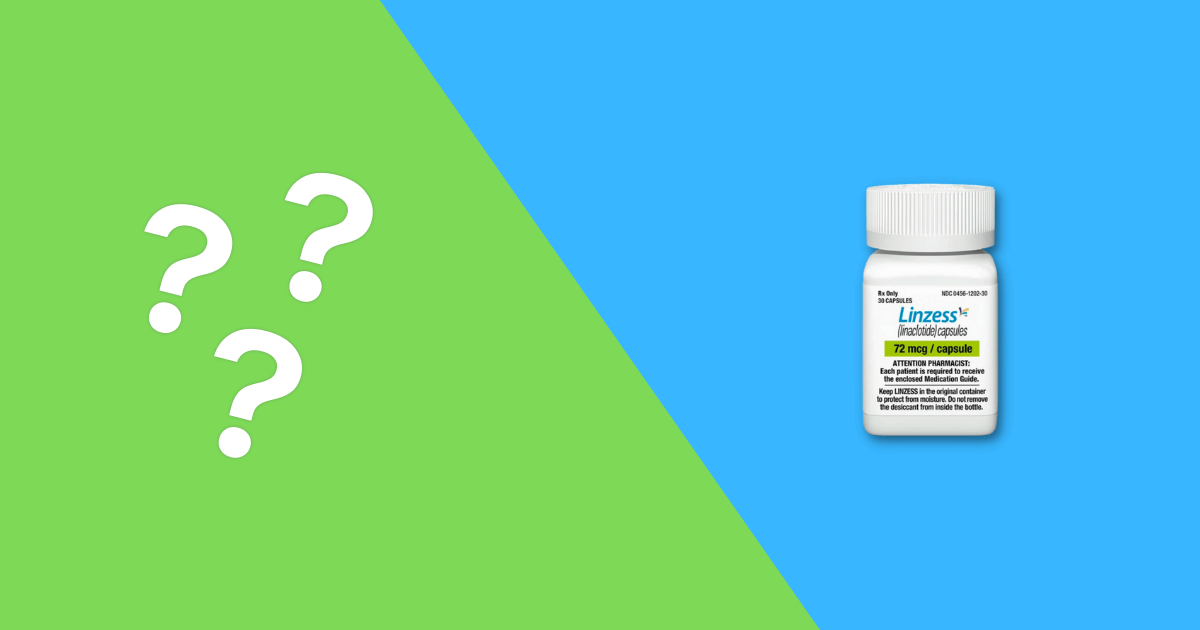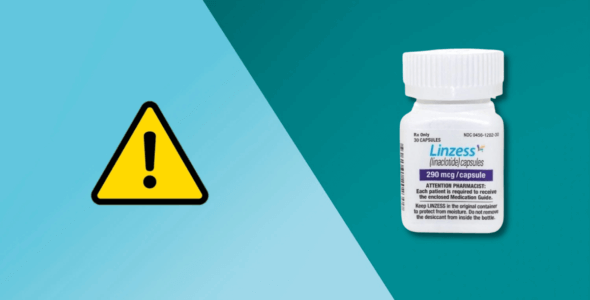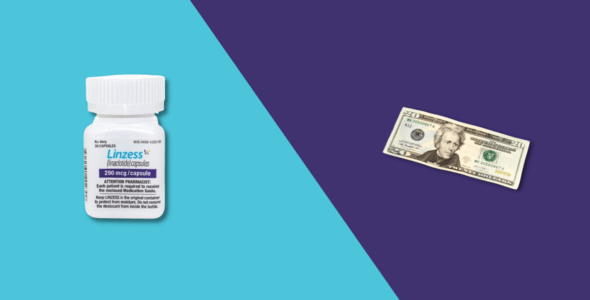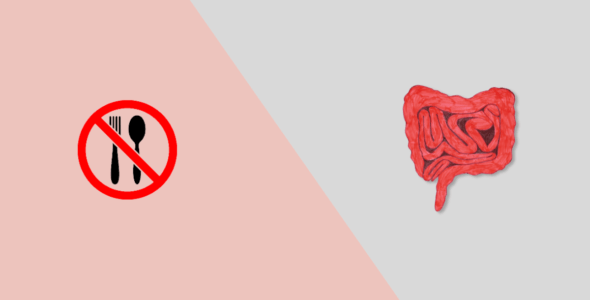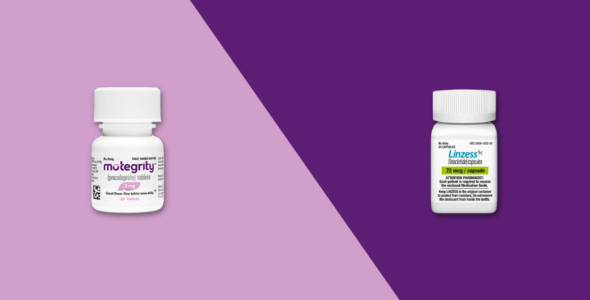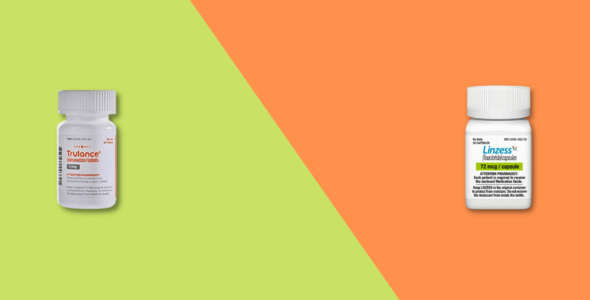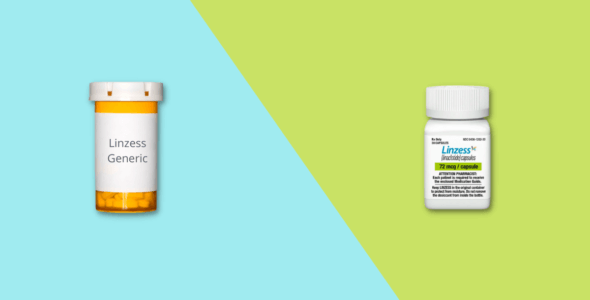Linzess alternatives: which other medications can I take?
Table of contents
Linzess (linaclotide) is the brand name of a prescription medication manufactured by AbbVie and Ironwood Pharmaceuticals. It is used to treat constipation, but it is not a laxative. Most often, it’s prescribed to treat IBS-C (irritable bowel syndrome with constipation) and chronic idiopathic constipation (CIC).
Linzess is an expensive brand-name medication with several alternatives available. Learn more about what Linzess is, how it works, its side effects, and its alternatives.
What is Linzess?
Linzess belongs to a group of prescription drugs called guanylate cyclase-C agonists. The active ingredient in Linzess is called linaclotide. Linaclotide is not easily absorbed in your body which is a positive result as the drug is able to reach your bowels where it is able to do its work, instead of being absorbed and dispersed within your body.
When linaclotide reaches your bowels, it binds to the cells in the walls of your gut to stimulate bowel movements. Once there, it increases the amount of water and other fluids that pass from your body into your bowels, softening your stools. It does this by increasing the secretion of chloride and water. It also decreases the activity of sensory cells in your bowels, reducing any pain felt.
If someone is constipated, they find it difficult to pass a stool. Their stools may be hard and dry, and they may feel bloated and in pain. This can lead to the development of hemorrhoids, anal fissures, and fecal impaction. Chronic constipation is constipation that lasts several weeks or longer. Irritable bowel syndrome (IBS) is a group of conditions that can cause abdominal pain and bowel problems, including constipation. You should not use linaclotide if you have a blockage in your intestines.
RELATED: What is Linzess
What are the side effects of Linzess?
Linzess can cause adverse reactions. The most common side effects tend to be mild and restricted to the bowels, as the medication is not absorbed easily into your blood. From clinical trial data, typical side effects can include:
- Gastrointestinal side effects such as diarrhea, bloating (abdominal distension), cramping, stomach pain, flatulence, dizziness
- Infection side effects such as sinusitis and upper respiratory tract infection
Less common side effects of Linzess include:
- Viral gastroenteritis
- Allergic reactions e.g. hives
- Severe diarrhea
- Severe stomach pain
- Weight loss or weight gain
Although diarrhea is a common adverse effect of Linzess, it should pass. If it lasts for more than seven days, and you feel lightheaded, dizzy, or faint (signs of dehydration), or if your diarrhea is severe, stop taking the medication and contact your physician. Diarrhea caused by Linzess can stop other medications from working properly, especially medicines with exact doses. If side effects persist, you may be offered an alternative drug such as Amitiza.
Prolonged diarrhea could stop birth control medication from working, so you should use other methods of contraception when taking Linzess. It is unknown if this medication passes into breast milk. Consult your doctor before breastfeeding.
If you experience any serious side effects while taking this medication, you or your healthcare provider can send a report to the Food and Drug Administration’s (FDA) MedWatch Adverse Event Reporting program online (http://www.fda.gov/Safety/MedWatch) or by phone (1-800-FDA-1088).
What doses of Linzess are available?
Linzess is available in capsule form in the following doses: 72 mcg, 145 mcg, and 290 mcg.
The recommended dosage in adults will depend on the condition being treated. Linzess is not recommended for pediatric patients younger than 18 years of age. You should take this medication on an empty stomach at least 30 minutes before your first meal of the day.
Do not chew or crush the capsule or the contents of the capsule. If you have problems swallowing capsules whole or have a nasogastric or gastrostomy tube, refer to the full prescribing information for how to open the capsule and how to take it with applesauce or water.
RELATED: Linzess Dosage
What happens if you stop taking Linzess?
Stopping treatment with Linzess may cause withdrawal symptoms, such as changes to bowel movements and the return of chronic constipation symptoms within one week.
Linzess drug interactions
Linzess can interact with other medications. These include:
- Progestins – etonogestrel, levonorgestrel, norgestrel
- NSAIDs – bromfenac, diclofenac, ibuprofen, naproxen
- Proton pump inhibitors – esomeprazole, lansoprazole, omeprazole
- Levothyroxine
- Bisacodyl
- Magnesium hydroxide
Linzess can interact with other medications. This can change how Linzess and other medications work and make side effects more likely. Tell your prescribing physician about all drugs you’re taking, including over-the-counter drugs, vitamins, and dietary supplements. In particular, tell them if you’re taking medicines that increase the risk of diarrhea, like laxatives, medicines for stomach ulcers, and NSAIDs.
Why is Linzess dangerous?
Linzess may cause severe diarrhea and lead to severe dehydration in a child (loss of a high amount of body salt and water). You should only take Linzess under the advice of a doctor. Do not take Linzess if you have a bowel blockage.
Why is Linzess so expensive?
Linzess is a brand-name medication currently not available in a generic form. Branded medications generally are more expensive, mostly due to the manufacturers who have researched, developed, and produced the drug re-couping their costs.
RELATED: Why is Linzess so expensive?
Are Amitiza and Linzess the same?
Amitiza and Linzess both treat constipation, but they are not the same. Amitiza is classed as a bicyclic fatty acid and prostaglandin E1 derivative and is taken twice a day. Linzess is classed as a guanylate cyclase C agonist and is taken once daily.
Linzess vs Amitiza
Amitiza is prescribed for chronic idiopathic constipation, opioid-induced constipation, and irritable bowel syndrome with constipation. It is available in a generic form and may cause diarrhea, headache, or nausea as side effects. Amitiza has only 1 drug interaction but more disease interactions than Linzess. You are advised to discuss which treatment is the most suitable for you with your healthcare provider.
Linzess vs Miralax
Miralax is prescribed for bowel preparation, acute constipation, and constipation. It is available in a lower-cost generic form. Miralax also has more side effects and drug interactions than Linzess.
What is a good alternative to Linzess?
FDA-approved alternatives to LInzess include:
- Amitiza (lubiprostone), belongs to a drug class known as chloride channel activators. Amitiza is FDA-approved for the treatment of CIC in adults, opioid-induced constipation (OIC) in adults with chronic non-cancer pain, and IBS-C in women 18 years of age and older. Doses of Amitiza will depend on the condition you are being treated for. Common side effects of Amitiza include nausea, vomiting, diarrhea, gas, bloating, and indigestion. Those experiencing severe diarrhea, fainting, low blood pressure, or prolonged breathing problems should discontinue Amitiza and speak to their healthcare provider immediately. Amitiza is not recommended for use in people with GI obstruction
- Lactulose, an osmotic laxative, is available in solution and powder form to be mixed with water before consumption. Lactulose is indicated for the treatment of chronic constipation. Common side effects of lactulose include nausea, vomiting, bloating, and gas. Speak to your doctor if you are intending to use lactulose if you are diabetic
- Motegrity, a serotonin-4 (5-HT4) receptor agonist used for the treatment of CIC in adults. Side effects of Motegrity include abdominal pain, diarrhea, nausea, vomiting, bloating, gas, fatigue, headaches, and dizziness. Motegrity may also cause more serious side effects such as behavior and suicidal thoughts. Those experiencing this side effect should discontinue Motegrity and speak to their healthcare provider immediately. Motegrity is not recommended for use in people with intestinal obstruction or perforation
- Trulance (plecanatide), is also a guanylate cyclase-C agonist. Trulance is similar to LInzess in terms of the side effects and allergic reactions it causes. Those experiencing severe diarrhea should speak to their healthcare provider immediately. Trulance is also used for the treatment of CIC or IBS-C in adults. It is not recommended for use in children under 18 years of age and is also contraindicated in children younger than 6 years old due to it causing severe dehydration. Trulance is also not recommended for use in patients with gastrointestinal (GI)obstruction
- Zelnorm (tegaserod), is also a serotonin-4 (5-HT4) receptor agonist for the treatment of IBS-C in adult women under 65 years of age. Side effects of Zelnorm include diarrhea, nausea, indigestion, dizziness, headaches, and anemia
- Stimulant laxatives such as Dulcolax (bisacodyl)
- Saline laxatives such as magnesium
- Bulk-forming laxatives such as psyllium
- Stool softeners such as Colace. These draw water into the stool, making them softer and easier to pass
Is there a generic alternative to Linzess?
A generic version of Linzess is not currently available.
Is lactulose better than Linzess?
Lactulose is a cheaper alternative, with fewer side effects than Linzess. Lactulose is available as a liquid, powder for reconstitution, or as a syrup. Lactulose does have more drug interaction and disease interactions than Linzess. You are advised to speak to your doctor for medical advice about your medical condition before starting any new treatments for constipation.
Is there an over-the-counter drug similar to Linzess?
Over-the-counter drugs similar to Linzess include:
- Stool softeners
- Saline laxatives such as magnesium
- Osmotic laxatives such as Miralax
- Stimulant laxatives such as Dulcolax (bisacodyl)
- Bulk-forming laxatives such as psyllium
- Probiotics
- Peppermint oil
Natural alternatives to Linzess
Lifestyle and dietary changes are natural remedies that may help relieve constipation and IBS symptoms and may be used with prescription drugs to aid your digestive system. Make sure you drink plenty of water and have fiber in your diet to help with the prevention of constipation. Exercise, for example, walking after a meal, can also help with bowel motility.
Speak to a registered dietitian or doctor of gastroenterology for medical advice about dietary changes that may help constipation.
What are some natural food sources of fiber?
Fiber is available in fruit sources such as apples, berries, and pears. Vegetables also contain fiber supplements, these include foods such as avocado, artichokes, nuts, wholegrain, and seeds.
What are the home remedies for IBS constipation?
Some remedies that help with constipation and improve your quality of life include exercise, reducing dairy intake, drinking plenty of water, relaxing, eating a healthy, well-balanced diet, and using laxatives carefully.
Medically reviewed
A medical professional has reviewed this article.


Jamie Winn, PharmD
Jamie Winn, PharmD
Dr. Jamie Winn received his Doctor of Pharmacy in 2002 from the University of South Carolina College of Pharmacy, Columbia, SC. Jamie is a medical reviewer for NiceRx.

